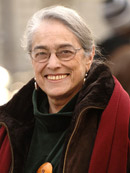 Suzan Mazur reports in HuffPost: on Evelyn Fox Keller’s talk on genetics, factual and fictional, at the recent D’Arcy Thompson festival. From her transcript:
Suzan Mazur reports in HuffPost: on Evelyn Fox Keller’s talk on genetics, factual and fictional, at the recent D’Arcy Thompson festival. From her transcript:
Today we are in a new century, one in which the landscape of biological thought is once again being radically reconfigured. With the maturation of molecular biology, the genome has been transformed from the executive director of biological development or as Schrödinger put it—-an architect’s plan and builder’s plan—-to the immensely complex physical-chemical structures that seem to need no new laws of physics only a Herculean effort of sifting through the jungle of physical and chemical interactions responsible for what it can and cannot do.
This explanation is itself largely the result of a turn from answering questions about nucleotide sequences calling for amino acids to the much harder questions about how particular proteins are produced in the quantities at the times and in the places in which they are needed for the normal functioning of the cell. More.
The selfish gene was recently spotted begging in front of a liquor store in Medicine Hat… We figure, whatever happens, he’s in for long-term unemployment, otherwise retraining.
Essentially, Dennett and Dawkins are just pop culture figures now.That’s the scandal of serious media continually fronting their views as if they matter, apart from name recognition.
 Suzan Mazur is author of Public Evolution Summit, an account of the ferment within evolutionary biology.
Suzan Mazur is author of Public Evolution Summit, an account of the ferment within evolutionary biology.
See also: At public evolution meeting in Scotland, crowd told: “gene” is not an accurate term
and
Is Nature now giving space to structuralism? *Note: Denton, as his book Evolution: Still a Theory in Crisis reveals, is a structuralist. He thinks that many puzzles of evolution will turn out to relate to as yet unidentified laws of physics and chemistry.